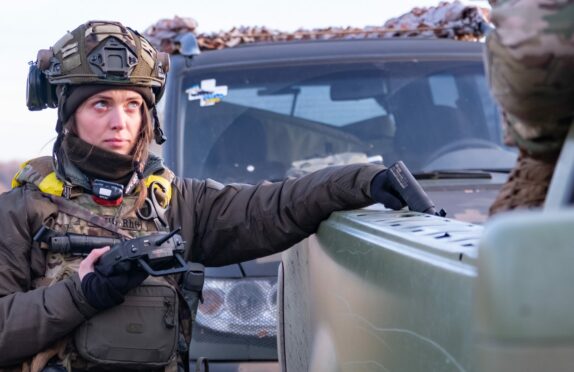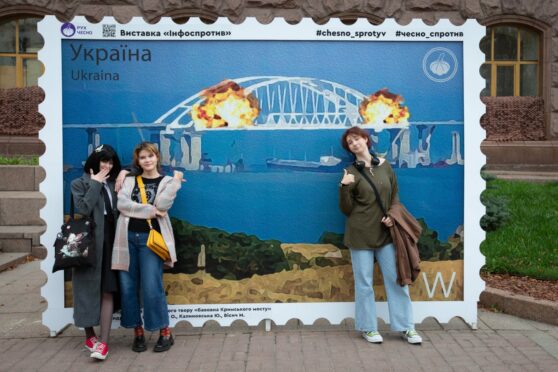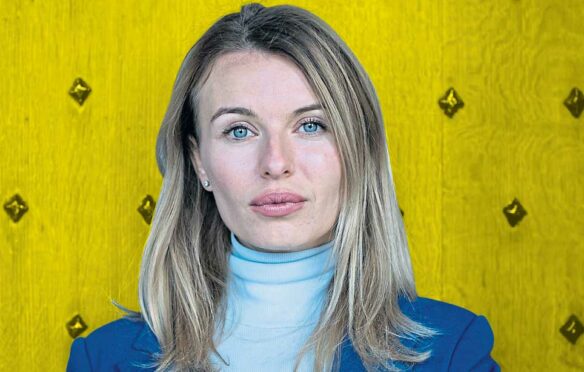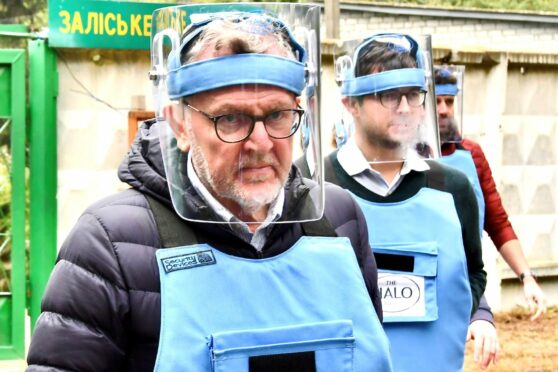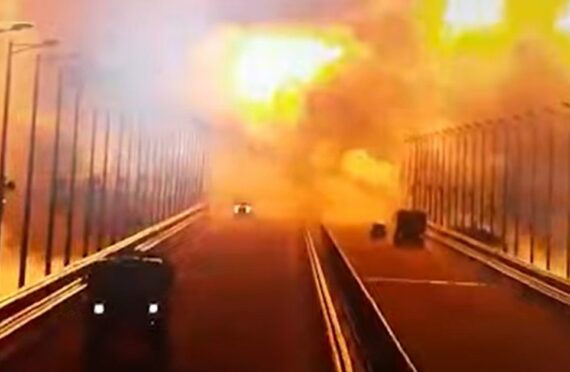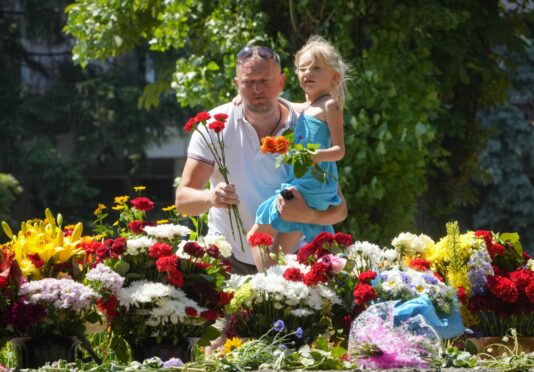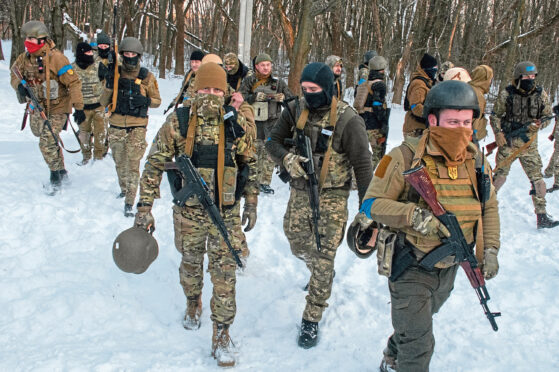
Evidence of Russian war crimes is mounting and Vladimir Putin may yet be prosecuted after the invasion of Ukraine, international investigators said yesterday.
Bill Wiley, who has extensive experience of bringing war criminals to justice in Syria, Iraq and the former Yugoslavia, said the indiscriminate shelling of towns and cities demanded investigation: “At this point you have the war crime of targeting civilians and civilian objects.”
He was speaking after a special war crimes investigation was launched by the International Criminal Court (ICC), where he was a former criminal investigator.
Yesterday, Ukrainian officials said at least 79 children have been killed and almost 100 wounded after weeks of relentless bombardment when schools, hospitals and churches were all hit. The United Nations said 579 civilians have been killed in Ukraine since the start of the war and more than 1,000 injured.
As Scottish prosecutors promised to assist international investigations into alleged war crimes, Wiley, executive director of the Commission for International Justice and Accountability, said: “We look at patterns because it’s very hard to build a case around a specific shelling incident, it’s almost impossible, unless you get good evidence that they were actually trying to hit that.
“They are throwing so much munitions into some of those built-up areas that I think hospitals, schools, kindergartens, they just get hit along with everything else.”
Meanwhile, towns and cities across Ukraine remained embattled last night with Russian troops reportedly 15 miles from capital Kyiv. Russian artillery pounded civilian areas on the outskirts of the capital as UK defence officials said invading troops were positioning to encircle the city.
Heavily armoured vehicles advanced on the northeastern edge of Kyiv and the suburbs have endured days of bombardment.
The Russians rained shells on civilian areas in other Ukrainian cities including hospitals in Mykolaiv and a mosque in Mariupol, the port city which has been devastated by two weeks of siege and aerial bombardment. Eighty people were inside the mosque at the time of the attack but no one was injured, Ukrainian authorities said.
An airport in the town of Vasylkiv, about 25 miles south of Kyiv, was targeted, while an oil depot was also hit, causing a huge blaze, the city’s mayor said. Ukraine president Volodymyr Zelensky said the war, which began 17 days ago, had reached a “strategic turning point”. Speaking from the presidential office in Kyiv yesterday, he said about 1,300 Ukrainian troops had been killed since the invasion, while up to 600 Russian soldiers surrendered on Friday.
He said Russia should release Ivan Fedorov, the mayor of the occupied city of Melitopol, who was kidnapped on Friday, according to CCTV footage released by the Ukraine government, describing the kidnapping as a “new stage of terror”.
Zelensky called once again for Nato to impose a no-fly zone over his country to halt bombing by Russian jets while promising his country remained defiant and determined. He said: “Even if they bring a million Russians here, they can’t occupy Ukraine.”
US president Joe Biden again rejected calls for Nato to close the sky above Ukraine, saying deploying Nato forces within the country against Russia could lead to “World War Three”.
“We will defend every single inch of Nato territory with the full might of a united and galvanised Nato,” he said. “We will not fight a war against Russia in Ukraine. Direct confrontation between Nato and Russia is World War Three, something we must strive to prevent.”
At a meeting of EU leaders near Paris on Friday, French president Emmanuel Macron criticised the UK visa policy for Ukrainians fleeing the war which required applicants to make submissions in person in Brussels or Paris.
“Despite all the grand statements, the British government continued to apply current rules that meant that they did not welcome Ukrainian refugees who wanted to reach British soil, saying they have to travel hundreds of kilometres in order to apply for a visa,” said Macron.
“It would help if the Ukrainian men and women who have lived through horror and crossed Europe to reach their families on UK territory are better treated.”
Ukrainians living in occupied areas of the south and east of the country are posting images on social media to show they are resisting the Russian army. Hundreds of citizens have been risking their lives to take to the streets and protest against the occupying forces.
Scores of protesters carrying the yellow and blue national flag in Novopskov, a small town of 10,000 people in the east of the country, were fired on by Russian troops. No one was killed but three people were injured, according to the town’s mayor. In Melitopol, a city of 150,000 inhabitants in southeastern Ukraine, demonstrators gather every day in one of the main squares and chant: “Go home, death to the enemies.”
Film surfaced on social media showing Russian soldiers handing out aid packages in the city but Ukrainians who posted the film claim they are Russian actors and it is a propaganda gesture.
In another city, Berdyansk, demonstrators in a main square surround a car with the Z symbol which has been used to express support for the invasion, and shout: “Go home while you are still alive.”
Ukrainian officials had hoped to use humanitarian corridors from Mariupol and towns and villages near Kyiv and Sumy to help evacuate people. Some 2.3 million refugees have left Ukraine since the fighting started on February 24.
Oleksiy Kuleba, the governor of the Kyiv region, said fighting and threats of air attacks hampered evacuation attempts. “We will try to get people out every day, as long as it’s possible to observe a ceasefire,” he said.
Meanwhile, fierce fighting around Mariupol hampered attempts to bring aid into the city. “There are reports of looting and violent confrontations among civilians over what little basic supplies remain in the city,” the UN Office for the Co-ordination of Humanitarian Affairs said.
“Medicines for life-threatening illnesses are quickly running out, hospitals are only partially functioning and food and water are in short supply.”
People were boiling snow for drinking, using wood to cook and burying bodies near to where they lay, said a staff member of Medecins Sans Frontieres (Doctors Without Borders). “We saw people who died because of lack of medication,” he said. “Neighbours just dig a hole in the ground and put the bodies inside.”
Western countries accused Russia of spreading “wild” conspiracy theories after Moscow’s envoy to the United Nations told diplomats that America and Ukraine had researched using bats to conduct biological warfare.
The US envoy said Russia had made the claims as false flag attempt to give it an excuse to use chemical weapons of its own in Ukraine.
Russian President Putin ramped up his rhetoric against Ukraine, accusing its armed forces of a “flagrant violation” of international humanitarian law.
His comments came after phone attempted peace negotiations with France’s Macron and German Chancellor Olaf Scholz, but there was no sign of Putin being willing to cease fire, according to the leaders. “Putin informed them about the real state of affairs of what is happening in Ukraine,” his office said in a statement.
The Russian leader accused the Ukrainian army of “extrajudicial executions of dissenters” and “taking hostages and using civilians as human shields”.
Experts said chemical weapons had been used by Russia in Syria to break the will of the civilian population to resist. “I think the thing people need to understand is that chemical weapons are not very deadly and not very effective against prepared soldiers but they absolutely terrify civilians,” Jack Watling, of the Royal United Services Institute, a land warfare think-tank, told the BBC’s Radio 4 yesterday.
“The way they were used in Syria in isolated cases was to show that civilians were very vulnerable and the effect it had in a number of towns was to break the will of the people to resist. If they are used in Ukraine, I expect it will be in these isolated incidents.”
Watling said Russia was switching its military tactics as the war entered a new phase, with Putin hoping to carve Ukraine between the east and west.
“The Russians are moving up a lot of artillery. We are seeing an intensifying of their shelling of Mariupol. Similarly, they are advancing on Dnipro. We are seeing an attempt to advance on that city which is essentially to cut the country in half,” he said.
Watling said the Russian army was facing a manpower shortage because it was fighting on different fronts and reportedly calling on the help of troops from Belarus and Syria and even asking for other foreign volunteers. General Sir Nick Carter, the former head of the British armed forces, has said Russian leaders must be questioning “what they have unleashed” in Ukraine.
“I would like to think that the people are beginning to wonder whether what they’re doing is morally right and therefore wondering whether or not they should be adhering to the orders that seem to be coming down to them,” General Carter said.
Jeremy Hunt, the former Foreign Secretary and Tory MP, said Britain should increase defence spending to the same relative level as the US because the policy of deterrence failed to stop Russia and Putin invading Ukraine.
In an article for The Daily Telegraph, Hunt wrote: “Peace comes from strength, not luck.”
He said that invasion of Ukraine is “the biggest failure of Western foreign and security policy in our lifetimes”.
The UK spent 2.3% of GDP on defence in 2021 compared to 3.5%in the US. To match Washington’s spending on defence, it would imply pumping billions of pounds more into the defence budget, something which Rusi Sunak, the Chancellor, is resisting.
Sir Keir Starmer, the leader of the opposition, has echoed calls for a rise in defence spending.

Enjoy the convenience of having The Sunday Post delivered as a digital ePaper straight to your smartphone, tablet or computer.
Subscribe for only £5.49 a month and enjoy all the benefits of the printed paper as a digital replica.
Subscribe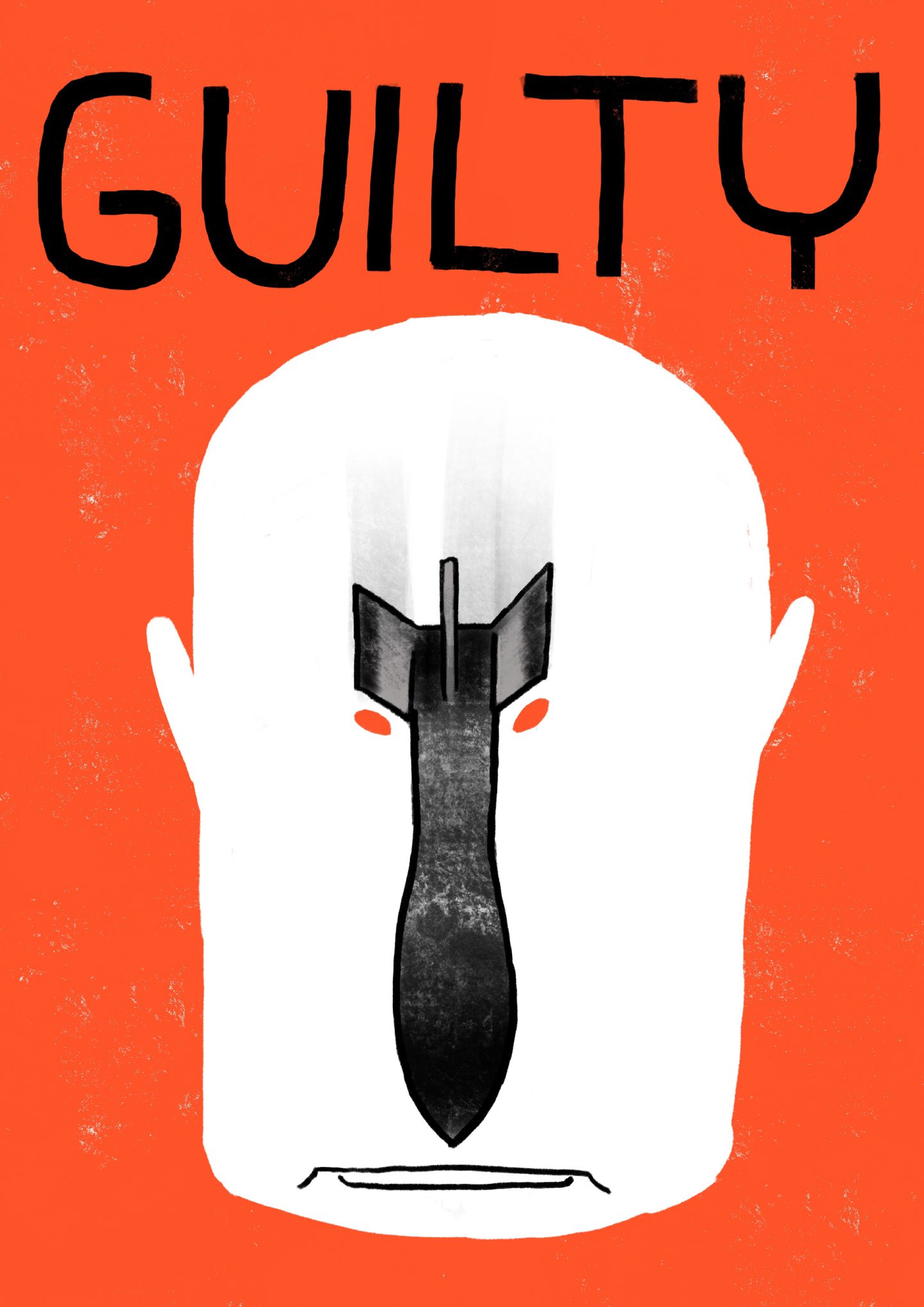 © SYSTEM
© SYSTEM